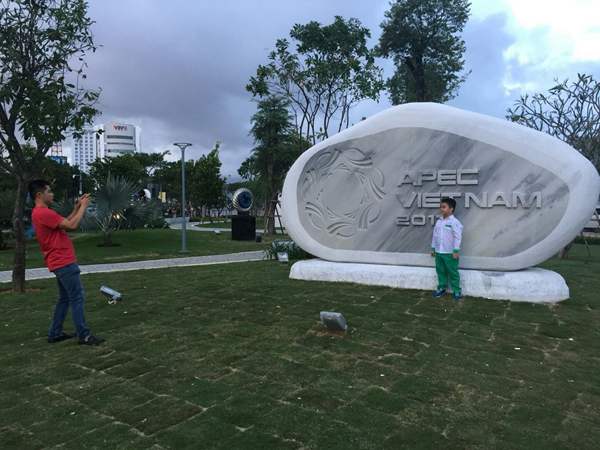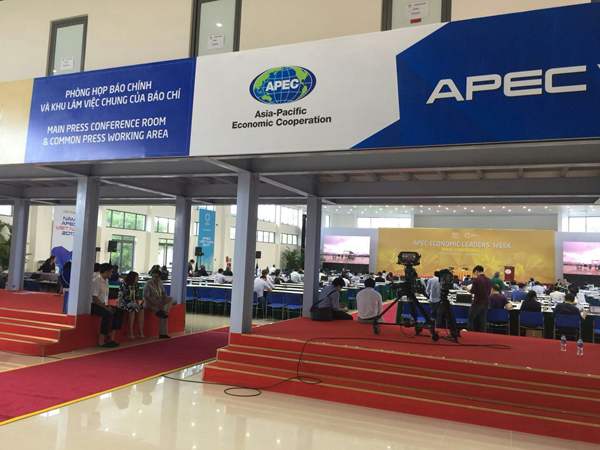


The 25th Asia Pacific Economic Cooperation (APEC) Economic Leaders’ Meeting kicks off today, Nov. 10, in Da Nang as leaders of the 21 member economies arrive in the coastal city in central Vietnam. At the two-day summit, leaders are expected to consolidate the momentum of APEC cooperation. The four priorities for discussion include promoting sustainable, innovative, and inclusive growth; deepening regional economic integration; strengthening the competitiveness of micro, small, and medium enterprises; and enhancing food security and nutrition and sustainable agriculture, said Pham Binh Minh, Deputy Prime Minister and Foreign Minister of Vietnam.
Xi’s attendance
Before arriving for the APEC Summit, Chinese President Xi Jinping said in a signed article published on mainstream Vietnamese media Nhan Dan of Vietnam that China supports Vietnam in hosting a successful meeting. China will work with Vietnam and other members to engage in practical discussions on deepening regional economic integration, building the Free Trade Area in the Asia-Pacific, strengthening regional connectivity, advancing economic structural reform and innovation, promoting inclusive development, and outlining the Post-2020 Vision, President Xi added.
Xi’s attendance will be the first international multilateral meeting attended by a Chinese leader after the successful conclusion of the 19th National Congress of the Communist Party of China (CPC).
“The attendance of President Xi Jinping at the meeting in Da Nang fully demonstrates that China attaches great importance to strengthening economic cooperation in the Asia-Pacific region,” noted Li Baodong, Vice Foreign Minister.

Inclusive growth
Under the theme of “Creating New Dynamism, Fostering a Shared Future,” experts said inclusive growth is a key element that has been a key area for discussion at the APEC CEO Summit, part of the activities of the APEC Leaders Weeks, which started on Monday, Nov. 6.
As the recent elections in Europe and US indicate, there are communities where people feel they are not able to participate in the global economy and feel they are left behind, said Monica Whaley, president of the U.S. National Center for APEC, a Seattle-based U.S. business association.
“Leaders are thinking about how do we share the benefit and engage more people in the globalized economy,” Whaley said, adding that Internet, digital economy, and service trade inside the APEC economic bloc are seen by many business and political leaders as good tools to achieve that kind of inclusive growth.
FTAAP action plan
At the Beijing APEC Summit in November 2014, leaders endorsed the Beijing Roadmap for APEC’s Contribution to the Realization of Free Trade Area of Asia-Pacific (FTAAP). FTAAP, which has been envisioned as a major instrument for ensuring an open economy in the Asia-Pacific, is a manifestation of China’s steadfast pursuit for globalization.
APEC leaders have since reaffirmed their commitment to FTAAP at the Manila Summit in 2015, and a declaration of the FTAAP was issued by the Lima Summit in 2016.
APEC ministers had agreed to continue discussing the work plan on advancing the pact, Minh told the media on Nov. 9, when briefing on the outcomes of the 29th APEC Ministerial Meeting.
The member economies have formulated and determined fundamental content, as well as priorities to be included into the work plan, Minh said, according to Viet Nam News. However, the action plan has not been approved yet at the 29th Ministerial Meeting in Da Nang, he added. APEC ministers decided that they need more time to continue discussions in 2018 on the consensus-based priorities proposed by each member economy for the action plan.
Post-2020 Vision
When APEC Leaders gathered in Bogor, Indonesia, in 1994, they committed to achieve free and open trade and investment by 2010 for industrialized economies and by 2020 for developing economies. These targets became known as the “Bogor Goals.”
Since 1994, most of the APEC economies have changed dramatically, grown, and advanced dramatically.
As the 2020 targets are approaching, leaders are expected to assess how far both developing and developed members have achieved in reaching free and open trade and investment.
“It is time to think about what is next and to have high quality discussion on the 21st century issues that are relevant to the current economy,” Whaley said in an interview with People's Daily Online.
Minh said that to prepare itself for the fourth decade of development, as well as realization of the Bogor Goals, the ministers had discussed and voiced the necessity to maintain discussion on new cooperation orientation after 2020 in Da Nang.
 Fire brigade in Shanghai holds group wedding
Fire brigade in Shanghai holds group wedding Tourists enjoy ice sculptures in Datan Town, north China
Tourists enjoy ice sculptures in Datan Town, north China Sunset scenery of Dayan Pagoda in Xi'an
Sunset scenery of Dayan Pagoda in Xi'an Tourists have fun at scenic spot in Nanlong Town, NW China
Tourists have fun at scenic spot in Nanlong Town, NW China Harbin attracts tourists by making best use of ice in winter
Harbin attracts tourists by making best use of ice in winter In pics: FIS Alpine Ski Women's World Cup Slalom
In pics: FIS Alpine Ski Women's World Cup Slalom Black-necked cranes rest at reservoir in Lhunzhub County, Lhasa
Black-necked cranes rest at reservoir in Lhunzhub County, Lhasa China's FAST telescope will be available to foreign scientists in April
China's FAST telescope will be available to foreign scientists in April "She power" plays indispensable role in poverty alleviation
"She power" plays indispensable role in poverty alleviation Top 10 world news events of People's Daily in 2020
Top 10 world news events of People's Daily in 2020 Top 10 China news events of People's Daily in 2020
Top 10 China news events of People's Daily in 2020 Top 10 media buzzwords of 2020
Top 10 media buzzwords of 2020 Year-ender:10 major tourism stories of 2020
Year-ender:10 major tourism stories of 2020 No interference in Venezuelan issues
No interference in Venezuelan issues
 Biz prepares for trade spat
Biz prepares for trade spat
 Broadcasting Continent
Broadcasting Continent Australia wins Chinese CEOs as US loses
Australia wins Chinese CEOs as US loses